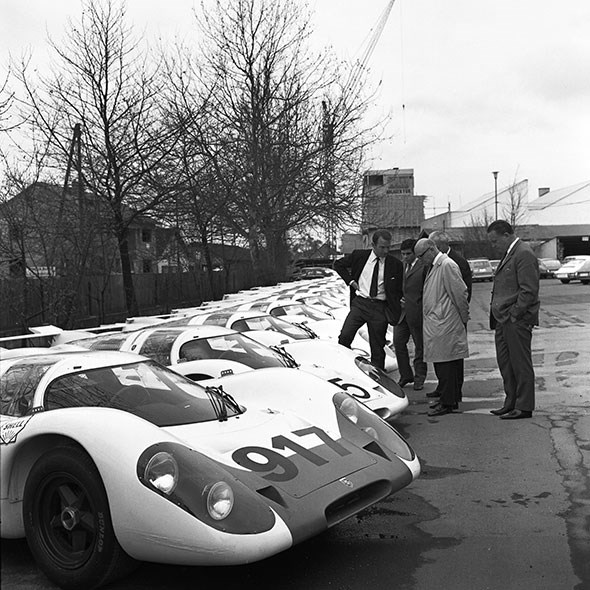F1 is dominated by Bernie Ecclestone, the incredibly wealthy and influential Brit who keeps most protagonists on a remarkably short leash. The 84-year-old Napoleon of motor racing is a thorn in the side of the 77-year-old Ferdinand Piech, the VW scion who is not a great fan of sharing power and profits either.
According to those in the know, Piech would only contemplate F1 if Ecclestone was prepared to give the teams a much bigger portion of the earnings. This would take a while – which is why VW’s most optimistic game plan for top-drawer motor racing starts about three years from now.
Three years is the estimated timeframe for a deal to be signed, for a team to set up, and for the initial brand-related input to bear fruit.
Which brand is VW preparing for F1?
Right now, the internal duel in the corridors of Wolfsburg is between Audi and Porsche. It’s worth stressing that in the current constellation, it is still a hypothetical battle, with virtual warriors and highly provisional rules. But believe us: the conversations are happening.
Audi has just signed off a €22 billion investment plan which it hopes will be instrumental in boosting annual production to two million units by 2020. No, this plan does not specifically mention F1, but its buffer zone is healthy enough to fund two all-new models and an even more ambitious motorsport strategy.
Audi in F1: the background
If Audi does join the grand prix circus, it would be the make’s third serious attempt at premier league racing. Over 20 years ago, Middle East money was at hand to finance Audi’s own engine, car and infrastructure – but then the oil bubble burst and the lords of the ring kept the engine up to to date for four consecutive seasons just in case the sheiks would reconsider.
In 1998, Audi bought Cosworth with the clear intent to enter F1, but again the deal failed to materialise and the engine specialist was subsequently spun off to Ford.
In the summer of 2014, the chequered flag taskforce reconvened once more at the green baize table, and this time Dietrich Mateschitz of Red Bull fame was allegedly part of the equation. The first round of talks centered around Toro Rosso, sources say. But according to two informants from Ingolstadt, the focus has recently switched to Red Bull.
To go solo or to forge a partnership in F1
Entering F1 with a partner rather than with a white piece of paper is exactly what Herr Mateschitz did when he acquired Jaguar F1, which had started life as Stewart Racing. Audi has apparently also voiced interest in a partnership, be it Toro Rosso or Red Bull. We don’t expect a decision before 2015, but there is no need to hurry since both teams’ engine deals are cast in stone and, besides, it takes the aforementioned three years before a competitive new powerplant is ready to strike.
That means no Audi F1 engine before 2018 at the earliest, and no sooner than 2019 for a new monoposto designed from scratch. Add two more learning years, and it becomes clear that the New German Racing Team would not be ready to pitch for the championship before 2021 or 2022. If this game plan does bear fruit, Stefano Domenicali – ex-Ferrari F1, now with Audi in a diffuse stand-by position – is of course one possible candidate for the motorsport director’s position.
Click here for 24 moments that made Le Mans.
Could VW approve a Porsche F1 effort instead?
What about Porsche’s ambitions to upgrade from LMP to F1? In the past, the Swabians have competed three times in F1. In the early 1960s, they fielded the 718 and 804 with mixed success. In the mid-‘80s, Porsche did extremely well with the TAG-Turbo entered by McLaren. The next foray was the overweight and slow Footwork Arrows racer which went exactly nowhere in the 1991-1993 seasons.
This time, Porsche would have to start from scratch again, but thanks to the LMP1 venture there is already a highly competent top-tier motorsport R&D team in place, with many specialists having previously worked for Red Bull or Sauber. Although an accurate assessment is difficult to make, Porsche may be a little better prepared for Hamilton-and-Vettel-bashing than Audi.
Why? Because Audi has lately been involved heavily in diesel development. Because it farms out a large portion of the technical development work to predominantly British specialist suppliers and engineers. And because the team and the back-up organisation are more familiar with touring car and endurance racing.
How and when will Volkswagen make its F1 decision?
Although most of the group’s key players have their thinking caps on, no decision has yet been made. After all, the Ecclestone blocker is still unresolved, the F1 rules are not sufficiently watertight, and despite the comeback of Honda the future competitive environment may not be transparent enough for high-end entrants like Audi or Porsche.
In addition, the string-pullers in Wolfsburg are keen on finding a potent main sponsor who would have to carry the lion’s share of the financial risk. The brand – Audi, or Porsche – must be properly prepared for that sportier new image, and the racing activities within the VW group would need to be spread more evenly to prosper.
Mid-term, WRC, LMP and F1 deserve three different umbrellas.
Do you think Volkswagen will sanction a return to F1? Let us know in the comments below.
